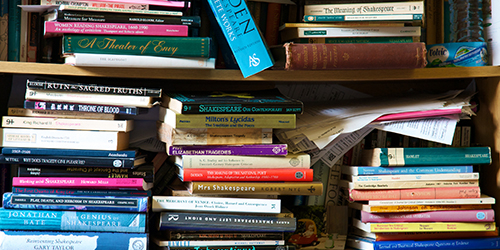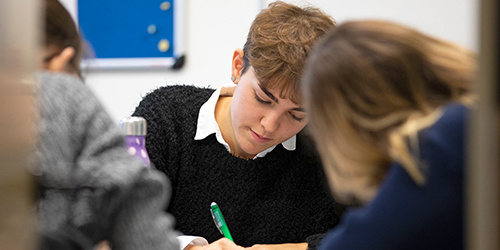Comparative Literatures and Cultures
Gain a unique critical perspective, studying the literary and visual cultures of different countries and communities in a comparative and historical perspective, with all texts available in English translation.
International study
Students on the joint honours degrees with a modern language add an international perspective to their studies by spending their third year abroad.
City of culture
Bristol is an exciting city in which to study arts and humanities, with a thriving cultural life, several art cinemas, concert halls and theatres, and a lively, cosmopolitan atmosphere.
First-class facilities
Benefit from the School of Modern Languages’ dedicated multimedia centre with access to over 2,000 films, a mini-cinema and a recording studio.
Comparative Literatures and Cultures courses for 2026
Single Honours
Joint Honours
Comparative Literatures and Cultures at Bristol
Bristol's comparative literatures and cultures courses will suit bright, imaginative, hard-working students with an international outlook and a fascination with literature, culture, and society.
You will study global literatures and cultures, using methodologies from textual, cultural and visual studies, as well as from translation, philosophy, history, social science and critical theory. You will read texts in English translation, with expert guidance from teaching staff in the School of Modern Languages and from other departments and schools in the Faculty of Arts. There is a wide choice of optional units about literature, culture and history across the world.
If you opt for the four-year joint honours course with Modern Languages, you can choose to study one of French, German, Italian, Portuguese (beginners only), Russian or Spanish. Alongside practical language classes (reading, writing, speaking, grammar and translation), you will take units relating to the social histories, literatures, cultures and societies of countries where your chosen language is spoken.
We have an international reputation for research and scholarship which informs our courses at all levels. Our courses are designed to support your development as an independent learner and allow you to explore your individual interests.
The course balances breadth and depth well through a blend of units on literature, visual arts, and politics rooted in diverse cultural perspectives. The lecturers are friendly and approachable, creating a welcoming learning environment that encourages vibrant conversation both in and outside the classroom. It deepened my appreciation for how culture shapes the world.
Career prospects

Our courses help you to develop skills that are highly valued by employers, such as intercultural understanding, analytical and critical thinking, clarity and self-confidence in communication, an aptitude for collaborative work and creativity.
Many careers necessitate the cultural understanding you will gain during your studies. Bristol graduates from similar courses have entered careers in teaching, translating, academia, finance, industry, publishing, the media, law, travel and British and international civil services.
Comparative literatures and cultures graduates develop an international outlook and experience that is sought after by employers internationally.
Course structure

Teaching is delivered through lectures, tutorials, seminars and workshops. In years one and two, core units introduce you to the practices and debates of comparative literature and the study of visual cultures (e.g. photography, street art and film). These units also show how insights and methods drawn from postcolonialism and decolonization, translation studies, multiculturalism, and multilingualism can throw new light on the comparative study of Literatures and Cultures.
Those taking the joint honours course with a modern language will spend the third year studying or working abroad. This year is assessed through skills-based project work in the target language. Throughout the degree, language classes are taught by expert language teachers.
In your final year, you will undertake an innovative independent research project on a topic of your choice, working closely with an academic supervisor. The project will consist of two elements:
- you will research and compose an extended essay on your chosen subject.
- you will have the chance to think creatively about how you might disseminate your research findings to a non-specialist public, presenting your ideas for this at a ‘Comp Lit and Cultures Final Fair’.
Assessment methods are varied and include presentations, essays, exams, collaborative projects, reports and dissertations. Language assessment consists of formative and summative assessment composed of various elements, such as grammar, translation, writing, and oral skills.
Global experiences

The joint honours courses allow you to immerse yourself in the culture, politics and society of the countries where your chosen language is spoken, through both study and travel.
You will spend your third year exploring the culture and society of the host country while studying at a partner institution, teaching English or undertaking a work placement, providing you with an inspiring authentic experience.
International experiences such as summer Study Abroad schemes may also be available for single honours students.
For more information about the year abroad and other international opportunities visit the Centre for Study Abroad.
